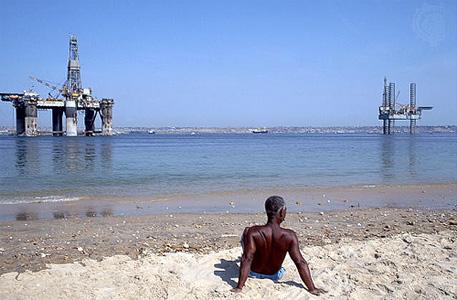Angola’s New Oil & Banking Legislation – By Kissy Agyeman-Togobo, Songhai Advisory

 Songhai Advisory LLP is a bespoke business intelligence consultancy providing critical insight on market opportunities in Sub-Saharan Africa.
Songhai Advisory LLP is a bespoke business intelligence consultancy providing critical insight on market opportunities in Sub-Saharan Africa.
Foreign oil companies operating in Sub Saharan Africa’s second largest oil producer, Angola,
will have the next two years to get to grips with new legislation governing their financial transactions. The new law obliges oil companies operating in Angola – the bulk of which are foreign – to use Angolan banks rather than foreign banks to complete their financial transactions.
| Who’s Who? Oil and Gas |
| More than 40 companies are involved in Angolan oil and gas exploration joint ventures including many of the oil majors (BP, Chevron, Eni. ExxonMobil and Total). They are joined by other international oil services companies such as Wood Group and Halliburton. Sonangol, the state-owned oil company, acts as an exploration and production company and the concessionaire for offshore production sharing agreements in the country. |
Typically, before the passage of this law by legislators last month, international oil companies would use foreign banks for the payment of suppliers or their expatriate workforce, once the law is fully implemented this will no longer be possible. Oil firms as well as commercial banks will be given up to two years to adjust to the new law, according to Central Bank Governor, Jose de Lima Massano.
What this new law means is that oil firms will now be required to open accounts with domestic banking institutions, from which all payments related to their oil operations must be made. Payments to third parties, from tax authorities to suppliers, whether based in Angola or abroad, will all have to be processed from local banks. The objective is to strengthen the Angolan economy – to insulate it against the type of volatility seen in 2009 on the back of the global financial crisis (though there are concerns that an influx of foreign currency could lead to an appreciation of the Kwanza). Additionally, the Angolan government argues that the current exemptions provided to oil companies regarding the use of foreign financial institutions are no longer necessary since Angolan banks have matured and are able to deal with such transactions themselves.
Insulation
It would be difficult to overstate the importance of the hydrocarbons sector for Angola. Production of around 1.8 million barrels per day accounts for approximately 45% of GDP, 76% of government revenue and 96% of export revenue. International oil price volatility in 2009 caused a domestic macroeconomic crisis, the consequences of which included fiscal and current account deficits, a slowdown in credit, exchange rate depreciation and a drop in international reserves from US$17.5 billion (5.1 months import cover) to US$12.6 billion (3.6 months import cover). Although there has been a significant recovery in 2010-11, vulnerabilities have been exposed. Arguably, obliging oil companies to conduct financial transactions through Angolan banks could contribute to the development of the domestic banking sector and create something of a buffer against the type of volatility seen in 2009.
As noted in IMF Country Report 11346, Angola already maintains a number of restrictions on foreign exchange transactions:
1. Limiting the availability of foreign exchange for invisible transactions, such as travel, medical, or educational allowances
2. Limiting unrequited transfers to foreign-based individuals and institutions.
3. Limiting remittances on dividends and profits from foreign investments not exceeding US$100,000
4. Allowing discriminatory application of a 0.015% stamp tax on foreign exchange transactions
Thus far, it does not appear as if oil companies are overly concerned about the changes. VP for Maersk Oil, Jon Ferrier,told Dow Jones in reference to the new law: “we want more transparency in the banking system. So that’s going in the right direction”.
The Central Bank is keen to implement the new law in two phases to allow the adjustment of its monetary policy and for oil companies and local banks to implement the necessary changes. In the first phase, oil companies will use local banks to pay taxes and bills owed to local providers. The second phase would require oil companies to use local banks to make payments to foreign suppliers.
| Who’s Who? Banking |
| There are twenty licenced banks in Angola, the largest of which are the Banco Africano de Investimentos (BAI), Banco Espirito Santo Angola (BESA), Banco de Fomento Angola (BFA), Banco de Poupanca e Credito (BPC) and Banco BIC, together accounting for around 80% of sector assets according to PwC. |
It is not yet clear precisely what impact this new law will have on the various linkages within the oil sector but what it does do however is to tie Angola’s banking industry more intimately to the oil sector.
View from the Ground:
Songhai Advisory had the pleasure of speaking with a senior executive within Angola’s state-owned bank, Banco BAI and here are his reactions to the new changes:
” It’s definitely a good idea. Oil companies have been busy using their own banks for a long while. The oil companies prefer to use their own banks rather than Angolan, maybe because our modus operandi is different. But using our banks now means we have more control. Banco Bai and other national banks are much more rigid and given that a number of our Central Bank Governors formerly worked with BAI, there’s no way that BAI will make any transfer that goes against central bank regulations”.





